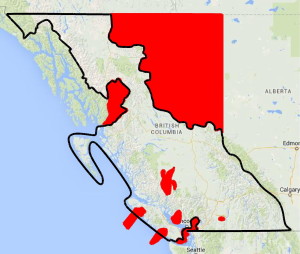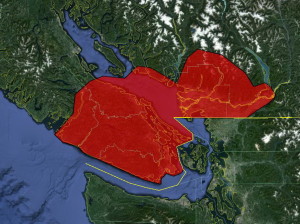Common sense or not? I can imagine how long it would take to consult and get a firm decision, all the while pipeline integrity is at potential risk.
http://www.mondaq.com/article.asp?articleid=779954&email_access=on
Case to Watch: Does the Duty to Consult Apply to Maintenance of Existing Pipelines? - Willms & Shier Environmental Lawyers LLP - 11 Feb 19
In Aroland First Nation v Transcanada Pipelines Limited, the Ontario Superior Court of Justice declined to decide on a motion whether the duty to consult applies to routine maintenance activities, specifically integrity digs and hydrostatic testing, for pipelines approved before the courts articulated the duty to consult. The issue was brought before the Court on a motion for partial summary judgement. The Court held that the issue could not be "fairly and justly decided" on such a motion. Instead, the issue will be dealt with in the main action. This action raises interesting legal issues with practical significance for proponents and Indigenous communities. The ultimate decision will fill in details about how and when to apply the duty to consult.
Background
TransCanada operates four natural gas pipelines (located largely underground) within the traditional territories of Aroland First Nation ("AFN") and Ginoogaming First Nation ("GFN"). AFN and GFN exercise Treaty and Aboriginal rights within their traditional territories.
Under the National Energy Board Act, the National Energy Board ("NEB") has jurisdiction to approve construction of interprovincial pipelines by issuing Certificates of Public Convenience and Necessity ("Certificates"). Certificates continue in perpetuity.
The pipelines at issue in this case were approved prior to judicial recognition of the duty to consult. Consequently, AFN and GFN were not consulted prior to the issuance of the Certificates for the pipelines. Certificates authorize the certificate holder to do all "acts necessary for the construction, maintenance, and operation of its line."
As part of its routine maintenance operations, TransCanada conducts regular testing procedures on pre-approved pipelines, including:
- integrity digs, which involve excavating 8 to 18 meters in length along a pipeline and take approximately 23 days to complete, and
- hydrostatic testing, which involves drawing large amounts of water from local water bodies into a pipeline and takes approximately 55 days to complete. Hydrostatic testing involves some ground disturbance.
There have been approximately 247 integrity digs and 47 hydrostatic tests within the AFN and GFN's traditional territory since the pipelines were constructed. The court observed that "[o]bviously, these tests are very invasive as they require extensive disruption of land" but equally "pipeline safety is an important concern that motivates these tests."
In 2017, AFN and GFN issued an action challenging TransCanada's ability to conduct integrity digs around its pipelines without consulting AFN and GFN, and sought various forms of declaratory relief and damages. AFN and GFN subsequently brought a motion for partial summary judgment seeking one of the declarations requested in its statement of claim – a declaration that the duty to consult applies to pipeline maintenance testing conducted within their traditional territories.
Crown Conduct
The Crown owes a duty to consult when the Crow
- has knowledge, actual or constructive, of a potential Aboriginal claim or right, and
- contemplates conduct that could adversely affect that claim or right.
TransCanada argued that the Crown conduct at issue in this case was the issuance of the Certificates, which occurred from the 1950s to 1998. Pipeline maintenance is "all part of the same disturbance" that was caused by the historical approval of the pipelines. Courts have held that the duty to consult applies only to immediate or prospective Crown conduct, not historical Crown conduct. Therefore, the duty would not apply to pipeline maintenance in this case.
In contrast, AFN and GFN submitted that Crown conduct was permitting, by acquiescence, certain routine pipeline maintenance activities that are "highly invasive" and cause "extensive disturbance." Each invasive test constitutes a new disturbance to the land and a new adverse impact on known and asserted Aboriginal and Treaty rights. AFN and GFN argue that the Crown should consult prior to certain pipeline maintenance activities conducted on historically approved pipelines, particularly where the duty to consult did not exist at the time of pipeline approval.
Test on Motion for Partial Summary Judgement
In order to grant summary judgement, the Court must be satisfied that there "is no genuine issue requiring a trial with respect to a claim or defence." There is no genuine issue requiring a trial when the summary judgement judge "is able to reach a fair and just determination on the merits." To reach a fair and just determination, the summary judgement process must (i) allow the judge to make necessary findings of fact and apply the law to the facts, and (ii) be a proportionate, more expeditious and less expensive means to achieve a just result. On a motion for partial summary judgement, the Court must also consider the issue to be determined in the context of the litigation and "the risk of duplicative or inconsistent findings."
The Court in this case concluded that whether the duty to consult applies "is too thin a slice of the duty to consult analysis to do justice to the position of either side within the partial summary judgement process."
Splitting the analysis in this manner might "result in a failure of justice" because:
- in Haida Nation, the Supreme Court mandated a cautious, incremental and fact 1 specific approach to the duty to consult, which is inconsistent with a bifurcated analysis.
- to determine whether consultation applies on the motion for partial summary 2 judgement would require the parties to present evidence that would overlap with evidence to be presented at trial (on the scope and adequacy of consultation). This approach is both
- inefficient and gives rise to "a significant risk of conflicting findings of fact."
the parties dispute facts supporting the adverse impact analysis, which "tends to 3 inform other components of the [duty to consult] test."







